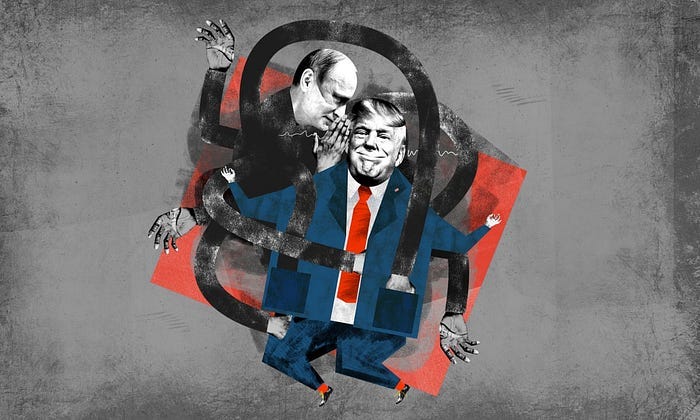Introduction
Donald Trump has long portrayed himself as a self-made billionaire, a master of business strategy, and a man who amassed wealth through savvy deal-making and relentless ambition. However, a closer examination reveals a different story, one marked by an extensive network of foreign financial dependencies, particularly involving Russia. Trump's financial dealings and his complex relationship with Russian investors add depth to the narrative surrounding his political rise, shaping the discussion about foreign influence in American politics. This article delves into the history of Trump’s ties to Russia, the financial lifelines extended to his business empire, and the implications for American democracy, offering a critical examination of the intersections between business, politics, and international influence.
The Myth of Self-Made Success
Donald Trump's public persona as a business tycoon is built on the premise of self-reliance and an uncanny ability to negotiate high-stakes deals. Trump’s image as a “successful outsider” who could bring business acumen to the White House resonated with voters frustrated by political gridlock and perceived incompetence. Yet, the reality of his financial empire reveals reliance on inherited wealth, risky ventures, and a string of bankruptcies. While he touted business prowess, the stability of his financial ventures was often bolstered by external support—particularly from Russian investors.
The Foundation of Trump’s Wealth: Inheritance and Missteps
Despite his portrayal as a self-made billionaire, much of Trump's initial fortune stemmed from the wealth and connections of his father, Fred Trump. Trump’s subsequent ventures were often marked by failed casinos, luxury real estate investments, and high-profile bankruptcies. In light of these failures, American banks became increasingly reluctant to lend to him, driving him to seek other sources of funding—leading to his enduring relationship with foreign investors, especially Russians.
The Initial Foray into Russia
In the late 1980s, Trump first expressed an interest in Soviet business opportunities. His fascination with Russia began with a trip to Moscow in 1987, where he explored the possibility of building a hotel and establishing a real estate footprint in the Soviet Union. Although no deals materialized at the time, the venture planted seeds for future business pursuits, with Trump keenly aware of Russia as an untapped market with opportunities for growth. The trip also exposed Trump to the Soviet system, where power and influence could often trump business norms and regulations.
Despite the complexities of dealing with Soviet bureaucracy, Trump's interest in Russia continued to grow. He recognized the potential for partnerships, which set the foundation for future dealings with Russian oligarchs and entities tied to the Kremlin. Trump’s willingness to work within an opaque system and forge ties in the region foreshadowed his later entanglements with Russian wealth.
A Financial Lifeline from Russian Investors
By the 1990s, Trump's business ventures had accumulated significant debt. As American banks distanced themselves, he turned to unconventional sources of financing. Russian individuals and entities began providing critical investments at a time when Trump’s empire was on the brink of collapse. In a departure from the scrutiny of American financial institutions, these Russian investments often arrived in cash and with limited transparency. The funds allowed Trump to stave off bankruptcy, restructure debts, and maintain his image as a successful businessman.
Russian investments took many forms, from the purchase of luxury condominiums to investments in Trump’s casinos and golf courses. The consistent flow of funds raised questions about the influence Russian financiers could exert over Trump. Critics argued that his dependence on Russian capital made him vulnerable to coercion, particularly given the shadowy nature of the transactions. Trump’s companies often declined to disclose investor identities, citing confidentiality agreements. This lack of transparency cast doubt on whether any quid-pro-quo arrangements were involved and the degree to which Trump’s business interests had become intertwined with foreign ambitions.
The Flow of Russian Money: Cementing Ties and Raising Alarms
In the late 1990s and early 2000s, Trump’s financial ties to Russia continued to deepen. Russian oligarchs, some looking to launder money and others to secure assets in the West, found Trump properties appealing for investment. These transactions were often conducted through shell companies, making it difficult to trace the origins of the funds. Estimates suggest that hundreds of millions of dollars flowed from Russian sources into Trump’s businesses during this period, enabling him to withstand financial challenges and maintain his real estate empire.
This steady influx of Russian money bolstered Trump’s status as a global real estate magnate, positioning him as a player in the international market. However, the opaque nature of these deals, along with Russia's strategic use of oligarchs as political operatives, raised concerns about potential influence over Trump. Critics argued that Trump’s dependence on Russian wealth compromised his independence as a businessman and, later, as president. The network of Russian financial entanglements became a focal point of scrutiny during his presidency, with investigators seeking to understand the depth of influence exerted by Russian interests on his political decisions.
Political Ramifications: Russian Influence and the 2016 Election
The 2016 U.S. presidential election revealed a convergence of interests between Trump’s ambitions and Russia’s geopolitical goals. Russia’s interference campaign—aimed at creating discord, delegitimizing opponents, and promoting Trump’s candidacy—was extensive, relying on social media manipulation, disinformation, and hacked information from the Democratic National Committee. The overlapping goals and Trump’s reluctance to criticize Russia fueled suspicions about the extent of Kremlin influence.
Special counsel Robert Mueller’s investigation focused on connections between Trump’s campaign and Russian contacts, examining whether Trump’s financial ties to Russia created vulnerabilities that Russian agents could exploit. While Mueller’s findings did not conclusively establish direct collusion, they did reveal the presence of multiple contacts between Trump campaign officials and Russian intermediaries, as well as Russian attempts to gain influence through social media and digital channels.
Implications for National Security and American Democracy
The extensive financial entanglements between Trump and Russian entities serve as a cautionary tale about the potential influence foreign powers can exert on American leaders through economic channels. These ties underscore the risk of financial dependencies on foreign actors with strategic interests counter to those of the United States. Trump’s business history illustrates how foreign influence can permeate national politics, creating situations where a leader’s financial interests may conflict with national priorities.
Protecting Democratic Institutions: Lessons for the Future
In the aftermath of the 2016 election, the importance of safeguarding democratic processes from foreign interference has become a central concern. Ensuring transparency in financial dealings, particularly for public officials, is critical for maintaining the integrity of American democracy. Measures such as the DISCLOSE Act and Honest Ads Act, which aim to address transparency in campaign finance and digital advertising, are essential to counteract the influence of foreign capital. Furthermore, stricter regulations on shell companies and the real estate sector are necessary to prevent money laundering and the influx of untraceable foreign funds into American markets.
Trump’s Legacy and the Question of True Success
The narrative of Trump as a successful businessman and master negotiator has been central to his public image. Yet, as this examination reveals, his empire was sustained in part by foreign capital, particularly from Russia. The layers of secrecy surrounding his business dealings and the reliance on foreign wealth undermine the myth of self-made success. Trump’s story is a testament to the complexities of modern capitalism, where success is often a product of connections, external support, and the ability to navigate opaque financial systems.
While Trump’s ascent may be attributed to his resilience and shrewdness in capitalizing on foreign opportunities, it also raises ethical questions about the compromises involved in accepting substantial foreign investments. His financial history and business ties to Russia illuminate the influence of wealth on political trajectories and serve as a reminder of the need for robust checks on the financial interests of public officials.
Conclusion
The story of Donald Trump’s relationship with Russia challenges the traditional narrative of self-made success, revealing a complex network of financial dependencies and foreign influence. His dealings with Russian investors exemplify how unchecked foreign wealth can seep into American political and economic systems, raising questions about accountability and national security. As the United States moves toward the 2024 election, the lessons from Trump’s financial entanglements underscore the importance of vigilance in protecting democratic institutions. In an era where the lines between business and politics are increasingly blurred, maintaining transparency and accountability is essential to preserving the integrity of American democracy.
The future of American politics may depend on the choice between truth and illusion, as the narratives of self-made success give way to a more nuanced understanding of the role of foreign influence. Safeguarding democracy requires addressing both symptoms and root causes, ensuring that future leaders are not beholden to foreign interests masked as financial success.











